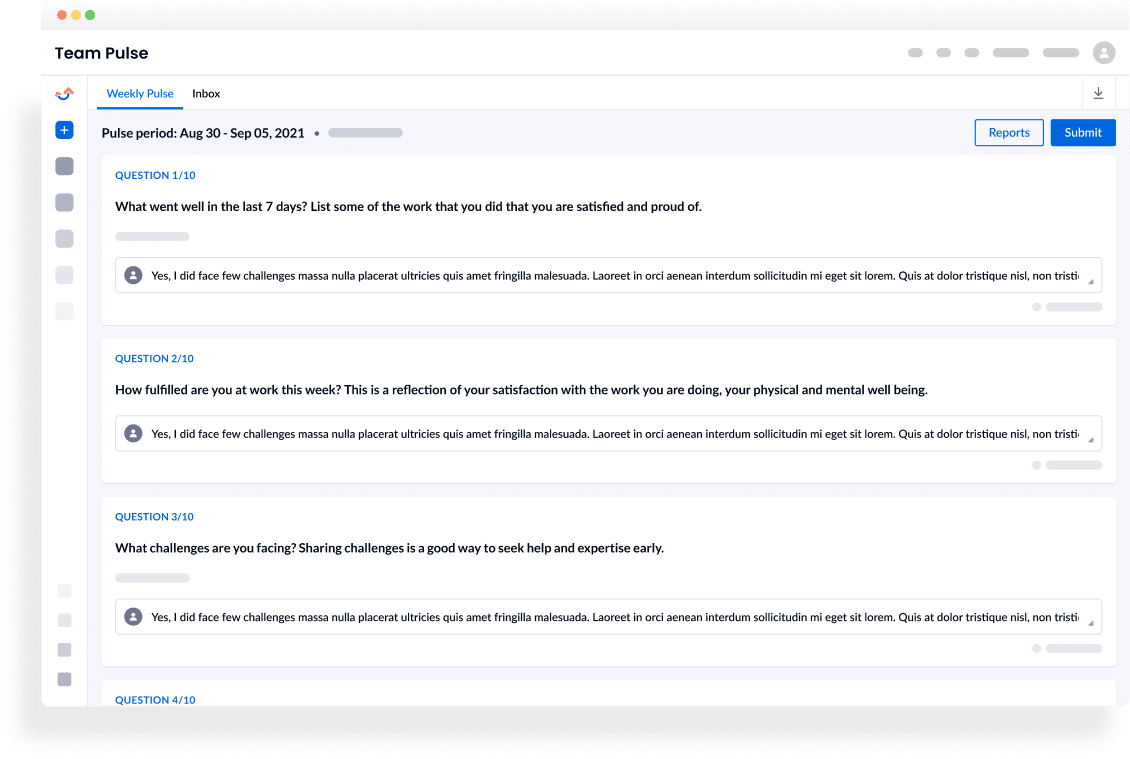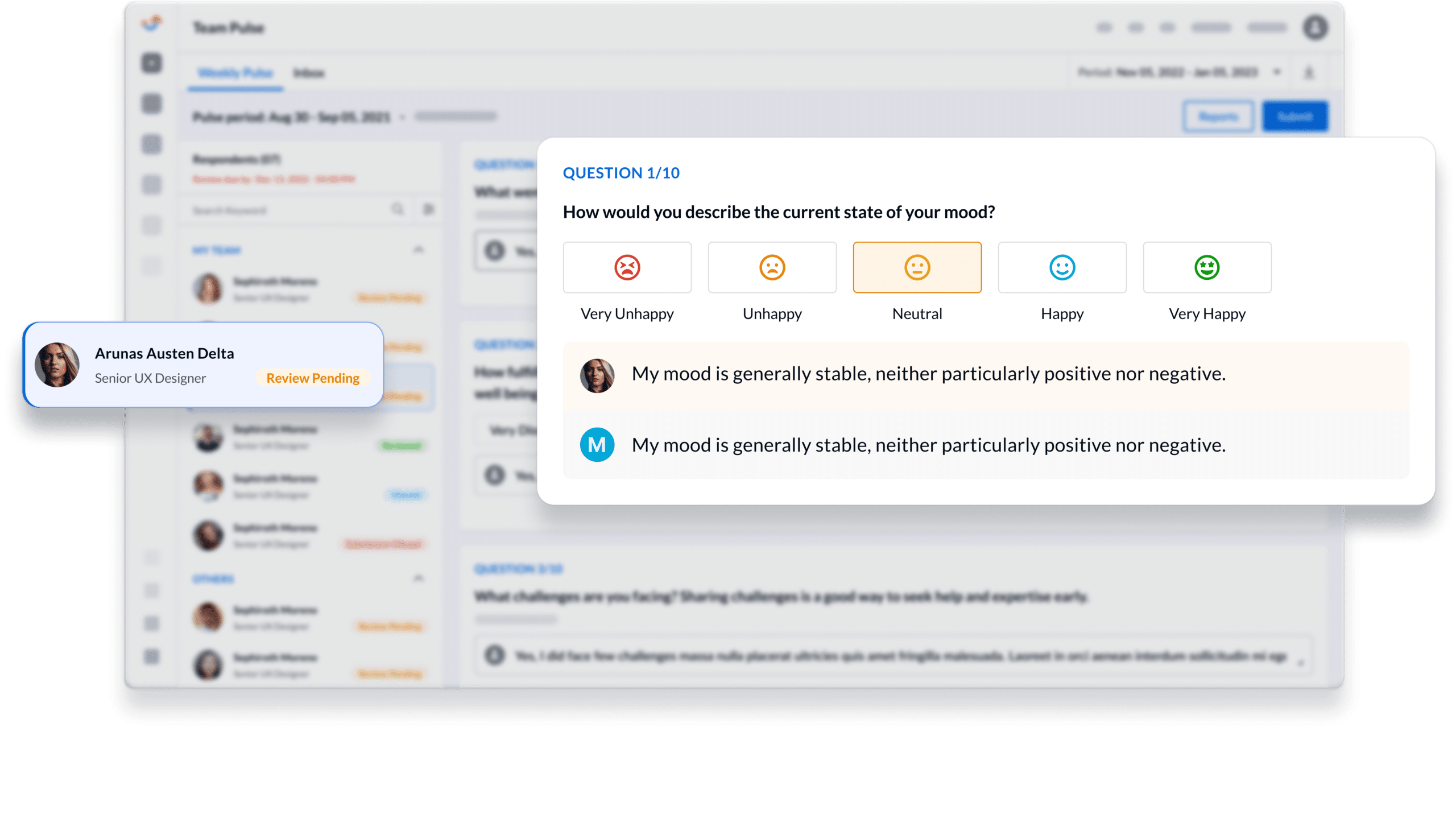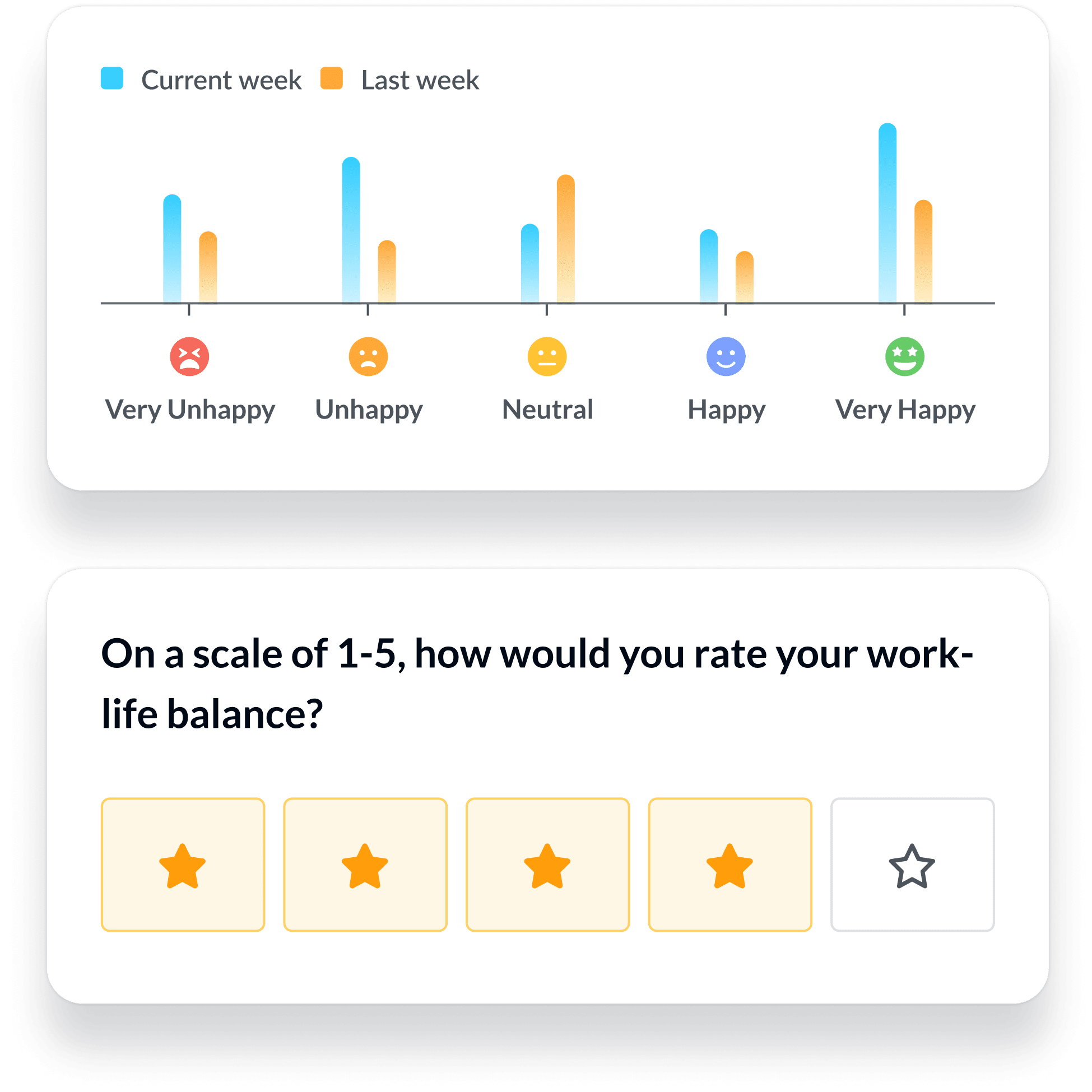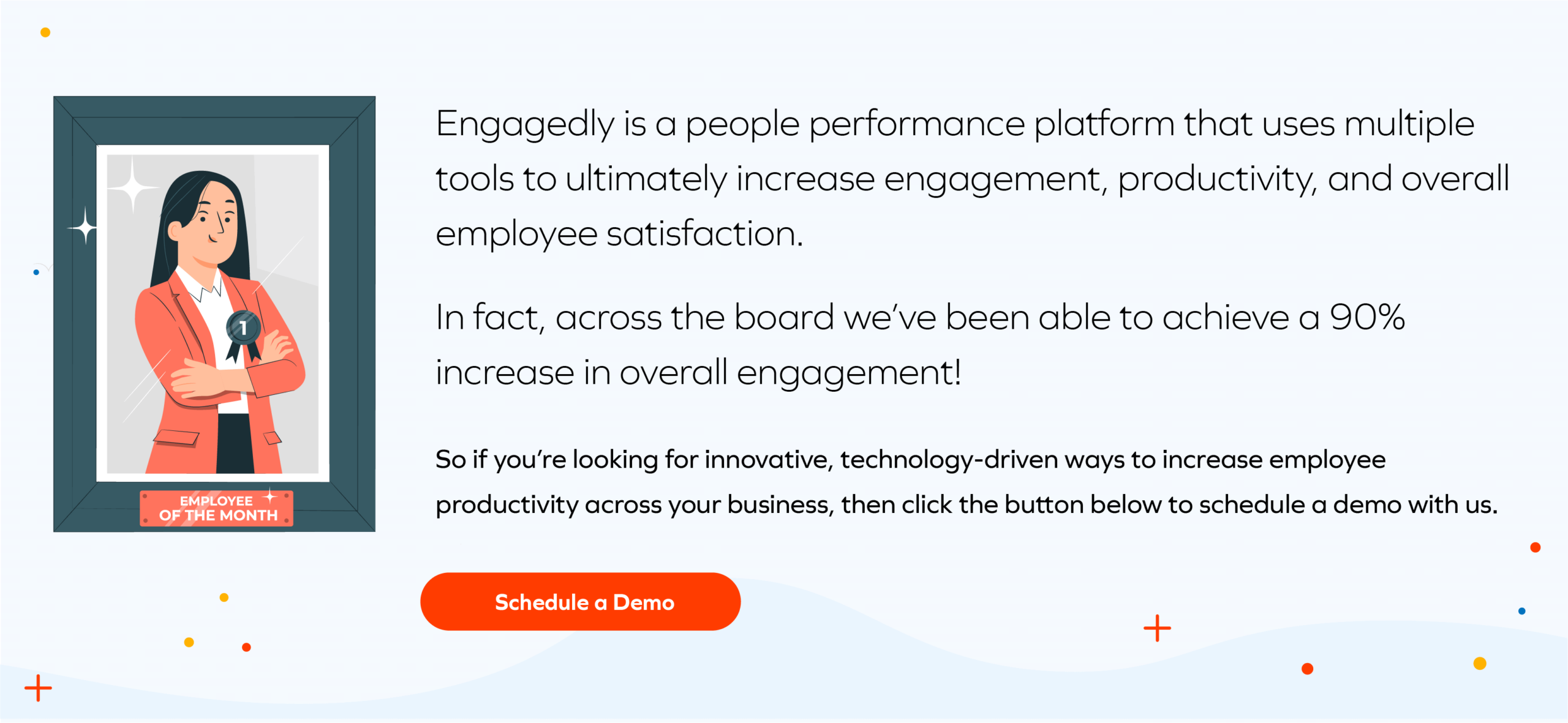Employee engagement strategies are rapidly revolutionizing the modern workplace with comprehensive and cutting-edge approaches. An employee engagement survey is one of the most reliable ways to measure a company’s employee engagement. However, completing an engagement survey is a time-consuming and tedious activity. Here, a pulse survey is a quick means of corporate communication to get employee feedback.
The typical response rate for an employee engagement survey is just 30–40%, whereas the average response rate for a pulse survey is 85%. The entire feedback process is streamlined and enhanced through a pulse survey. You can get feedback on workplace morale, challenges, and relationships by conducting pulse surveys. We have compiled the top pulse survey questions for your perusal. Let’s explore pulse surveys’ meaning, benefits, and important questions to include.
What Are Pulse Surveys?
Pulse surveys are quick ways to receive feedback from your employees. They can highlight present issues or chances to improve your employees’ working conditions. Pulse surveys, commonly conducted monthly, quarterly, or weekly, are intended to be shorter, more targeted, and more frequent than traditional annual or biannual engagement surveys. Pulse surveys are a less expensive and more effective way to learn about the workplace.
Employee pulse surveys are suitable for large and small businesses, and their popularity is growing constantly due to their many advantages. They help improve company culture, provide honest feedback to management, and increase employee retention.
Top 20 Essential Pulse Survey Questions
Employees can score or provide genuine feedback on a few targeted pulse check questions in pulse surveys. Here are some examples of the top pulse survey questions in 2025 you can use to gain insights into your workforce:
Questions About Employee Satisfaction
Employee discontentment poses risks such as increased turnover, diminished performance, and harm to the organization’s reputation. Factors contributing to this dissatisfaction include a lack of connection with coworkers, a surge in workload, and inadequate support from supervisors.
Understanding the satisfaction levels of your workforce is crucial. Content and loyal employees are more likely to stay with the company, becoming valuable brand ambassadors who aid in attracting and retaining talent. Consider incorporating the following pulse survey questions to gauge employee satisfaction:
- How satisfied are you with your current job?
- How would you rate your work-life balance?
- How likely are you to recommend your company to a friend or peer seeking employment?
Questions on Inclusion and Diversity

Key DEI-related questions for inclusion in pulse surveys are:
- Are diverse viewpoints and innovative ideas valued within the organization?
- Does the organization provide equal opportunities for learning and advancement to all employees based on merit?
- Can you express concerns or ideas without fear of repercussions?
Questions on Communication
Utilizing an employee pulse survey is a valuable method to assess the effectiveness of your organization’s communication channels. This tool aids in identifying strengths and areas for improvement, ensuring that communication serves as a catalyst for swift goal achievement while minimizing misunderstandings. Evaluating employee satisfaction with internal communications is pivotal in maintaining a cohesive and informed workforce. Consider incorporating the following employee pulse survey questions related to company communication:
- How effectively does the company communicate its goals, objectives, and strategic initiatives to its personnel?
- Are the communication channels we utilize—such as emails, instant messages, and internal platforms—effective in promoting collaboration and knowledge-sharing?
- Does the company cultivate a culture of two-way communication, where employees feel encouraged to share ideas, express opinions, and voice concerns?
- Does the organization demonstrate respect and appreciation for its employees’ contributions and achievements?
Questions on Company Culture

The pursuit of establishing and perpetuating a positive workplace culture is a primary objective for every leader. However, cultivating a culture centered on appreciation and creativity is a nuanced endeavor. To gain a comprehensive perspective, leaders can pose pertinent questions about organizational culture. Key inquiries include:
- On a scale of 1 to 10, how comfortable do you feel at work?
- Do you believe that your workplace actively promotes collaboration and teamwork?
- On a scale of 1 to 10, how closely do you perceive the alignment between the principles of your organization and your personal values?
- Do you have access to the necessary resources and technology to successfully carry out your tasks?
Questions on Work-Life Balance
Work-life balance is integral to promoting employee well-being, reducing stress levels, and enhancing overall productivity. Employees who perceive a harmonious balance between their professional and personal commitments are more likely to remain interested, motivated, and satisfied in their careers.
To identify areas where employees may face challenges in managing personal and professional responsibilities, consider asking the following questions related to work-life balance. This data can be instrumental in crafting strategies to foster improved work-life integration:
- How frequently do you find yourself working after regular business hours?
- Does your work schedule provide sufficient flexibility to meet your personal commitments and obligations?
- In your opinion, how effectively does the company support the mental health and overall well-being of its employees?
Questions on Leadership
Employees are sometimes required to step outside their comfort zones or exert extra effort, particularly in unforeseen circumstances. The success of leadership teams is significantly shaped by managers and leaders who actively support organizational change, foster employee participation, and ensure the provision of necessary resources for optimal performance.
To precisely assess the impact of their actions on their workforces, managers and leaders can leverage employee pulse surveys. These surveys serve as valuable tools for gathering feedback, enabling leaders to identify areas that may require adjustments. Consider incorporating the following questions in these surveys to gauge employee sentiment:
- Does your manager empower you to determine the best way to accomplish tasks?
- Are company leaders consistent in expressing gratitude for your contributions?
- How effectively do you believe leadership welcomes and values employees’ opinions and ideas?
Summing Up
Pulse surveys serve as a valuable tool for assessing team morale, gaining insights into ongoing projects, understanding the direction of your organization, and inspiring staff to excel in their roles. Crafting effective survey questions is paramount to acquiring accurate and meaningful data about various aspects of your workplace culture. Employing best survey practices, such as clarity, impartiality, and anonymous response options, ensures that you receive insightful feedback from respondents.
Leveraging a pulse survey platform to administer these thoughtfully crafted survey questions facilitates the swift gathering of employees’ feelings and sentiments. Engagedly, an employee performance management platform, streamlines the creation and analysis of pulse surveys. With features allowing for automated distribution to specific teams or departments at scheduled intervals, you can effortlessly collect relevant data and glean insightful employee statistics. This, in turn, opens avenues for organizational change and improvement. Schedule a DEMO with Engagedly today!
Frequently Asked Questions
Q1. What characteristics distinguish a quality pulse survey?
A quality pulse survey typically possesses characteristics such as clear and concise questions, anonymity options, regular and timely distribution, alignment with organizational goals, and the ability to gather actionable insights swiftly. It should prioritize clarity, impartiality, and relevance to effectively measure and improve various aspects of workplace culture and employee engagement.
Q2. How is a pulse survey taken?
A pulse survey can be distributed to the staff via email, a Google form, or a workforce management app for the quickest and most effective results. Avoid using the pen-and-paper approach, as this leaves room for lost records, inaccuracies, and unnecessarily long processing times.
Q3. What benefits does a pulse survey offer?
Pulse surveys enable you to concentrate on key employee metrics, including engagement, satisfaction, and retention. It aids businesses in locating issues and gaps so they may address them as soon as possible. Continuous learning about employee opinions and the resulting corrections is encouraged by pulse surveys.









